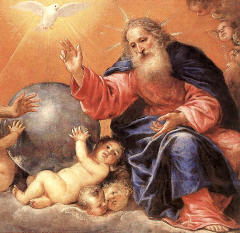 Divine Mercy Sunday
Divine Mercy Sunday
By Fr. Victor Feltes
On Easter Sunday evening, all of the apostles (besides Judas and Thomas) were gathered behind locked doors in the Upper Room. Yet the Risen Jesus came and stood in their midst and said, “Peace be with you.” St. Luke records that they “were startled and terrified and thought they were seeing a ghost.” So to reassure them, Jesus asked, “Why are you troubled? And why do questions arise in your hearts? Look at my hands and my feet, that it is I myself. Touch me and see, because a ghost does not have flesh and bones as you can see I have.” And Jesus showed them the enduring wounds in his hands and feet and side.
Jesus’ first order of business on Easter Sunday was to demonstrate to his disciples the fact of his bodily resurrection, and “the apostles bore witness to the resurrection of the Lord Jesus” for the rest of their lives. So either Jesus Christ rose again from the dead in his flesh or all the apostles lied; but who would ever die for what one knows to be a lie? They were amazed and overjoyed, and Jesus said again, “Peace be with you. As the Father has sent me, so I send you.” Then he breathed on them and said to them, “Receive the Holy Spirit. Whose sins you forgive are forgiven them, and whose sins you retain are retained.” Second to establishing the fact of his resurrection, of next importance was commissioning the apostles to spread Divine Mercy and giving them the authority to forgive sins.
Some people imagine that they themselves never commit sins. However, without great devotion, that is extremely unlikely. In his first New Testament letter, St. John taught that “if we say, ‘We are without sin,’ we deceive ourselves, and the truth is not in us.” Some Christians acknowledge their sins yet never come to confession and merely pray to God. Contritely praying to God is good, but if this were all the Lord desired for the forgiveness of your post-baptismal sins, then why did he give his Church’s priests the power to forgive sins? To do other than what he has ordained is presumptuous. Please do not be afraid to approach and receive this healing gift of mercy.
Since the year 2000, during the papacy of St. John Paul the Great, this 2nd Sunday of Easter has been celebrated as Divine Mercy Sunday. This is one fruit of private revelations (judged by the Church as being “worthy of belief“) to a Polish religious sister in the 1930s. Jesus told St. Faustina Kowalska, “When you go to confession, to this fountain of mercy, the blood and water which came forth from my heart always flows down upon your soul. … Here the misery of the soul meets the God of mercy. … Come with faith to the feet of my representative. … I myself am waiting there for you. I am only hidden by the priest… I myself act in your soul. … Make your confession before me. The person of the priest is, for me, only a screen. Never analyze what sort of a priest it is that I am making use of; open your soul in confession as you would to me, and I will fill it with my light.” Jesus declared, “The miracle of Divine Mercy restores that soul in full. Oh, how miserable are those who do not take advantage of the miracle of God’s mercy!” … Mankind will not have peace until it turns with trust to my mercy.”
I know how much I regularly need and benefit from Confession and I hope that you will soon avail yourself of this sacrament soon. Please do not be presumptuous and do not be afraid. Promptly approach this great and holy sacrament of Divine Mercy. and Christ’s peace will be with you.
















